Ouch. Long time no post.
At least none about Japan. However, it was not for the lack of things to happen here, rather the contrary. It’s hard to take the time and distance to synthesize and serialize impressions into meaningful, hopefully enjoyable, posts while you’re in the midsts of the cultural storm. A bit like trying to find references to explain how wet water is to Sahara Bedouins whilst scuba-diving yourself.
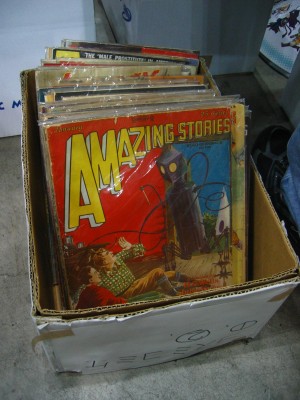
Well let’s start catching up with old, but at the time, and still, exciting news: Nippon 2007, “the first [science-fiction] WorldCon in Japan”! Granted I already blogged about it elsewhere, on the Xénobiophiles blog (along with my friend Sacha’s own post about the first day), but that was in French (Francophiles are invited to read both articles as they might differ in tone) and, well, elsewhere.
It was my first WorldCon, but I had been to the Utopiales International Science-Fiction Festival in Nantes twice before. To be honest, I found the Utopiales more friendly and accessible, for a couple of reasons: the site was smaller, and people with a pass (authors and fans) all hung out and ate in the same bar and restaurant, on-site. In addition to everything being free (food, drinks, cinemas), it gave plenty of opportunities to sit and chat with other people, fans and authors alike, in a very relaxed and friendly (and, granted, smoky) atmosphere. This definitely wasn’t the case at the WorldCon, and you really had to be lucky to hang out with authors (see below).
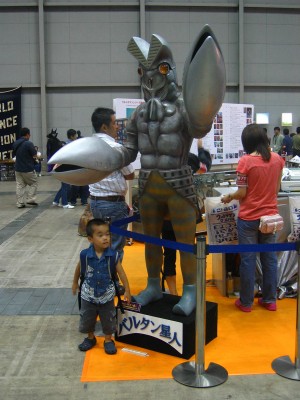
The other surprising omission of this WorldCon was that of a bookshop. Only few books and mangas could be found in the annex, and you never could buy a book to get it signed by the author if you hadn’t brought it with you. Well I had brought my Charles Stross and Robert Charles Wilson books with me, but it was still a bit of a disappointment.
On the other hand, there were plenty of panels to choose from at any given moment (minimum 6-10), either in English or Japanese. They had diverse and interesting topics, as well as interesting speakers. The panels covered discussions as varied as the role of the singularity in SF, religion (including imaginary or alien ones), sex, cyberpunk around the world, and an interesting interview with Ted Chiang. While these weren’t necessarily surprising topics, they were all examined and discussed from the liberal and abstract point of view of science-fiction, which led to occasionally fascinating arguments.
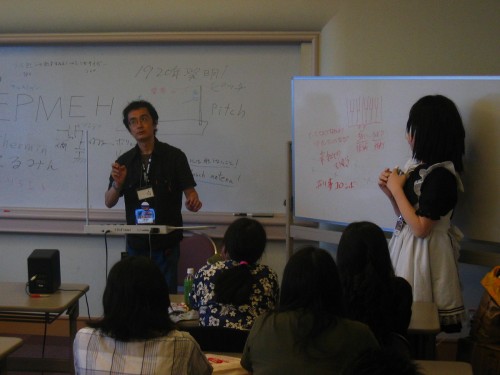
We even found a room where a Japanese guy was trying to convince his audience he could play the theremin — in all modesty, he couldn’t, but somehow many Japanese know about the theremin and they were all delighted to try it. It was a tVox Tour, Lydia Kavina’s theremin of choice. The differences with the Moog Etherwave I’m used to were subtle but interesting. The sound was rounder and beautiful in the high notes, but the notes felt less precise, especially in the higher range; I was told later that Lydia Kavina move her whole body when changing range to keep a good precision. Very interesting to feel a different theremin, as it’s such a special instrument to play, but I’d probably be looking at an Etherwave Pro if I were to get a better one… Speaking of theremin, Pamelia Kurstin will be playing at Le Bourg in Lausanne on December 19. Pamelia Kurstin is undoubtedly the craziest, prettiest, most talented theremin player in activity. Her new album, Thinking Out Loud, is pure magic. Le Bourg is a great café in Lausanne, about as close as you can get from alternative and surreal without stepping into a David Lynch movie.
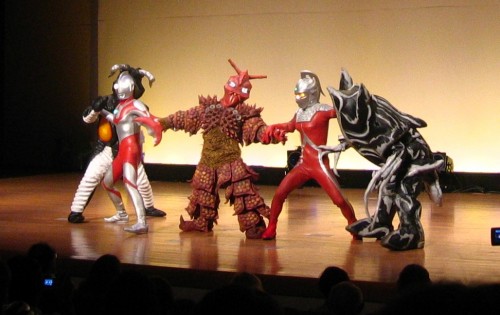
Now back to science-fiction. It was only during the Saturday evening ceremony that we were seriously reminded that we were on another planet — Japan. Before the initially puzzled, then amused and, eventually, delighted eyes of a mixed audience of authors cosplaying in smokings and nerds in their most glamour T-shirts, Ultraman showed up on stage to combat giant latex bugs and other Godzilla-monsters, all for the sake of saving an equally ridiculous innocent girl-voiced creature. And the Japanese love this kind of live-actor shows.
Georges “Oh My” Takei (Star Trek, Heroes) was the guest speaker, along with another anonymous presenter. The obligatory feminine presence was provided in the form of a girly woman presenter who, on another continent, would have been more explicitly introduced as a pom-pom girl. But that night, she just stepped back, giggled and shut up. This is also Japan.
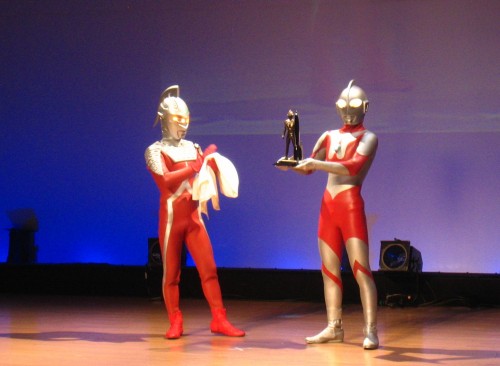
The Hugos were disappointing in two different ways. First, almost none of the winners showed up; but let’s attribute that to Japan being an expensive destination. Second, Neil Gaiman’s lovely How To Talk To Girls At Parties didn’t win the Best Short Story Hugo — it was my favorite story of all, and Charles Stross didn’t win for Best Novel either with Glasshouse. Granted, Glasshouse isn’t as strong as last year’s Accelerando. But I find the actual winner, Vernor Vinge’s Rainbows End, weak, flawed and surprisingly badly written, and I’m still struggling to finish it.
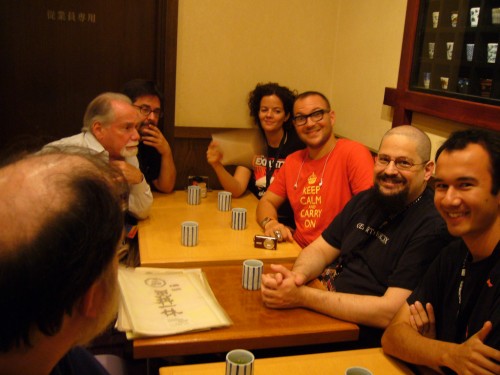
Earlier that day, Sacha and I had soba for lunch, in reasonably awesome company: Charles Stross, Robert Silverberg, Patrick Nielsen Hayden, Cory & Alice Doctorow (and Doctorow 2.0, in gestation phase). It’s not quite everyday that you eat with one of your favorite authors and fast-growing star of post-cyberpunk, singularity-influenced science-fiction (Stross). It’s not quite everyday either that the editor of the largest publisher of science fiction in the world, and winner of a Hugo (the science-fiction Oscars) later that day, buys you lunch (Nielsen Hayden). And it’s definitely not everyday that someone at the table tells you stories about hanging out with Isaac [Asimov] and Robert Heinlein (Silverberg). Great people, but also modest people, and without the faintest trace of star-like arrogance.
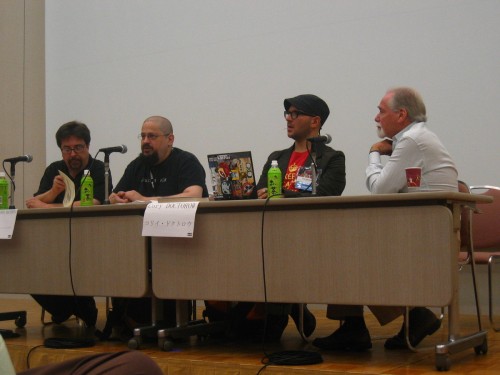
It was also a great occasion to catch up with Cory, whom I met in Nantes last year, and who kindly introduced us to Charlie Stross and Eileen Gunn (the famous editor of the Infinite Matrix webzine). He really is an endless amount of fun and contemporary insight, dramatically hyper-active, he seems to be on every front at the same time but surprisingly, it won’t prevent him from remembering every single detail. I believe he’s among the people who truly matter today, and will contribute to shaping whatever tomorrow’s society will be.
Aside from this once-in-a-lifetime lunch, it would be an exaggeration to say that authors abound at this WorldCon. Whether it’s a constant, or due to the exotic location, I do not know, but the fact was that the Con was mostly inhabited by fans, a term by which I do not simply mean “people who occasionally read SF”, but rather “professional fans who’ve been waiting the whole year for this”.
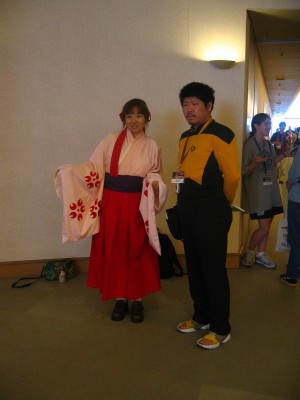
And indeed, 60-year-old retired American nerds do exist, and they all came to the WorldCon. Some even inadvertently performed sociological cosplay by requiring electric wheelchairs to move their imposing mass around, which brought to mind vivid recollections of both Baron Vladimir Harkonnen and the overweight American population from Georges Panchard’s Forteresse. Science-fiction becomes obsolete dramatically fast nowadays.
Many Japanese fans also attended the event, but the language barrier didn’t feel much less impermeable than in the everyday life of a gaijin in Japan.
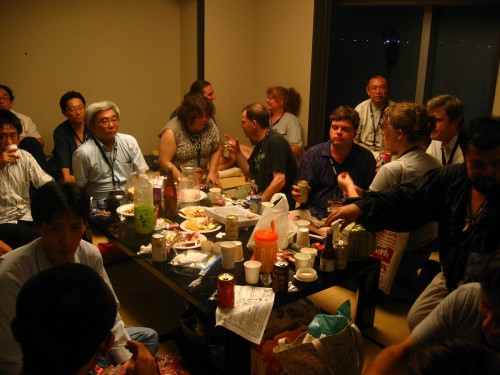
During the room parties on Saturday night, this translated to a hot, loud, effervescent but overall unexciting atmosphere, in spite of the inviting quantity of Japanese sake and Swedish akvavit. How they transited through the customs with so many bottles will remain a mystery.
When Cory came to me with the same conclusions, heading back to his room, I realized it was time to jump on a train to leave Yokohama and join other friends to go party in Roppongi. Tip: don’t go party in Roppongi, unless you’re a Japanese girl and you like disrespectful gaijin.
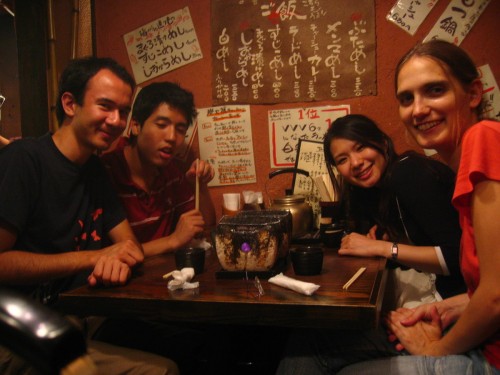
Yet, a fun night with good friends, which ended early in the morning with an awesome ramen, where you grilled your meat yourself on a charcoal grill. The morning kept ticking on, and soon it was time to part and jump in a train back to Yokohama.
While I was walking back to my hotel, my phone rang. Not from a call, just the alarm that I used during the week to wake myself up, at 7am. I reset the alarm to four hours later and proceeded to try out a short sample of sleep.
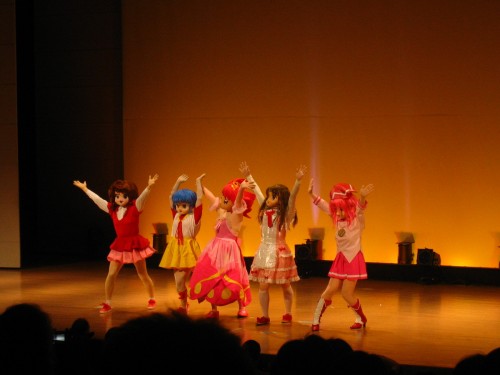
On Sunday, I attended a few more panels before heading to the Masquerade. I had heard of this great demonstration of costumes and fan acting, but to be honest, it didn’t blow my mind. While walking in Ōsaka, I frequently run into advertising actors wearing a giant-chicken-costume or an oversized anime character outfit, not to mention the fauna in Shibuya or, God forbid, Harajuku. I guess one risk of living in Japan is to become so used to outlandishness that you’d barely pay attention to a guy disguised as a giant robot.
In conclusion, I am not sure what I expected, or whether I expected something closer to my experience at the Utopiales, but the WorldCon was slightly disappointing. Too large, too desperately fandomy, and ultimately improper to get to know other people, fans or authors.
Nevertheless, it was overall interesting to see it once, attend unusual panels, hang out with my favorite authors, meet a couple of nice people, and buy an anthology of Japanese short stories. I certainly don’t regret it; I just hope that my next WorldCon (maybe in Montreal in 2009?) will prove even richer!
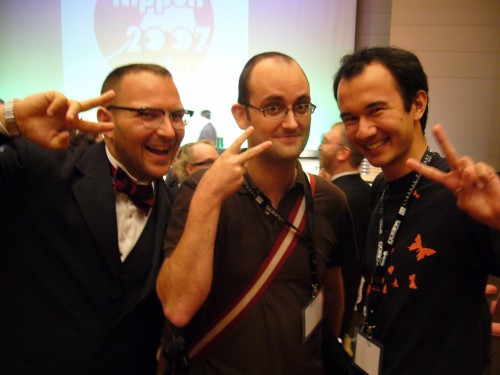
As a closing note, Sacha and I were interviewed by a French-speaking team working for the cool Tracks program on Arte. The interviewers were cool too, but obviously not cool enough to keep our sequence in the final show, I was just told. Shame on them, but well at least you got a blog post, and there’s always the flickr gallery!